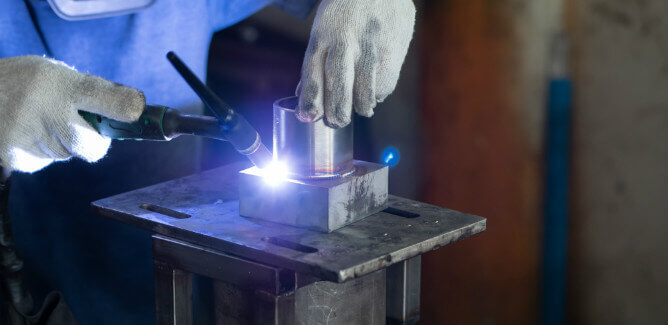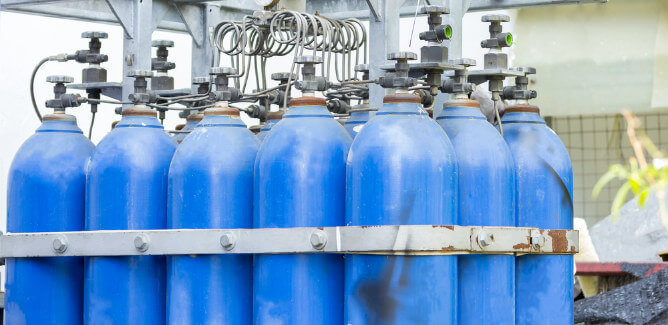
Argon vs. Nitrogen Purging for Atmosphere Inerting
Inert gases are gaseous substances that are chemically nonreactive with other substances under standard temperature and pressure conditions. The non-reactive property of inert gases makes them suitable for a host of industrial processes as they prevent explosions, corrosion, and other unfavorable phenomena.
Argon and nitrogen are two of the most widely-used inert gases in industries. Sometimes, an argon/nitrogen gas mixture is even used. Let’s take a closer look at the physical and chemical properties of both gases as well as common applications and comparisons.
Argon
Argon is one of the six noble elements of the periodic table. It is a chemically-nonreactive gas that is odorless, colorless, and non-toxic under a wide range of temperatures and pressures. Pure argon gas can be separated from atmospheric air through fractional distillation of the liquefied substance at cryogenic temperatures.
Argon Properties
Argon occurs naturally and makes up a small fraction (0.934% by volume) of atmospheric air alongside other noble gases and air’s major components which are oxygen (20.95% by volume) and nitrogen (78.09% by volume).
At a temperature of -185.86°C (-302.55°F), Argon undergoes a phase change from a gas into a liquid. Argon is denser than air and can displace oxygen within confined spaces.

What Do You Use Argon For?
Argon has several essential industrial and commercial applications, including:
- Neon lighting (in combination with neon and krypton)
- Prevents rusting/corrosion during metal fabrication (mitigates the oxidation process)
- Radioactive dating (via an argon-potassium mixture)
- Used as an inert shielding gas during welding (argon blanketing)
Is Argon Corrosive?
Argon provides sufficient inerting to several industrial processes and is non-corrosive under a wide range of temperatures and pressures. For example, it can be used to inert the production of iron and steel, which are sensitive to moisture.
Nitrogen
Nitrogen gas is a non-metallic gas that is odorless, colorless, and tasteless under normal temperature and pressure conditions.
What Do You Use Nitrogen For?
Nitrogen is widely used in the following industrial applications:
- Fertilizer manufacturing
- Explosives manufacturing
- Sterilization of containers in food processing plants
- Nitrogen gas inerting in oil and gas facilities and storage vessels of chemical plants (nitrogen blanketing)
How is Nitrogen Gas Generated?
Like argon, high-purity nitrogen can be obtained from atmospheric air via fractional distillation of the liquefied substance at cryogenic temperatures. Nitrogen gas production can also be achieved by means of pressure swing adsorption or hollow fiber membrane separation. Nitrogen gas can be generated on-demand at an industrial site using an onsite nitrogen generator.
Nitrogen Properties
Nitrogen is the largest component by volume and mass of atmospheric air. Nitrogen gas occurs naturally and is the fourth most abundant earth element after carbon, oxygen, and hydrogen.
Is Nitrogen Corrosive?
Nitrogen gas is a non-reactive substance that prevents combustion and corrosion during several industrial processes. It is also a non-toxic gas. The safety hazard, however, is due to its ability to displace oxygen (asphyxiation) in a confined space.
What Are the Industrial Uses of Argon and Nitrogen?
Argon is used to prevent combustion in several types of arc welding such as gas tungsten and metal arc welding. Nitrogen is an essential gas in the chemical industries for inerting and purging. In the oil and gas industry, inert gases help prevent down-hole combustion, e.g., during drilling, completions, and work-over (well remediation) operations.
Argon vs. Nitrogen Inert Atmosphere
Inert blanketing is the process of purging a volume containing a liquid or reactive gas with an inert gas such as nitrogen or argon to minimize the effects of oxygen. This prevents unwanted chemical reactions that could cause corrosion or explosions. An argon blanket or nitrogen blanket acts as a sort of inert shield to prevent oxidation.
Why Is Argon a Good Gas to Use for Purging?
Due to its highly-nonreactive nature, argon is suitable for inerting high-temperature industrial processes where other substances would react to cause combustion or corrosive action. Argon is the most cost-effective gas to use when nitrogen gas does not provide sufficient inerting.
Cost to Generate Argon
Argon is generated from liquefied air through fractional distillation in a separation unit. At a temperature of 87.3 K, argon boils out of the mixture. It is the same process used to separate liquid nitrogen which distills at a temperature of 77.3 K.
Why Is Nitrogen a Good Gas to Use for Purging?
Nitrogen gas is less inert than argon. Nonetheless, it is excellent for purging, shielding, or inerting several industrial processes. Since the raw material is ordinary air and it can be made using selective membranes, nitrogen is cheap to generate.
Cost to Generate Nitrogen
Nitrogen gas can be generated cost-effectively using nitrogen generation systems like Pressure Swing Adsorption (PSA) and membrane generators. How does a nitrogen generator work in each case?
PSA nitrogen generators utilize two stages of separation running at short intervals – an adsorption stage (containing an adsorbent material such as zeolite) to extract nitrogen and regenerative stage to desorb the gas. PSA systems can generate nitrogen gas of up to 99.999% purity.
On the other hand, membrane nitrogen generators use semi-permeable membranes to selectively recover the nitrogen component of air. Nitrogen produced this way can be up to 99.999% pure.
Trust NiGen for Your Onsite Nitrogen Generation
NiGen International provides high-efficiency nitrogen generation systems, pipeline maintenance services, and field services to several industries across the globe. We manufacture a range of containerized solutions which we provide on a permanent or rental basis to suit the most challenging operations.
Contact us online today to request a quote for any of our products or to speak with a professional.
